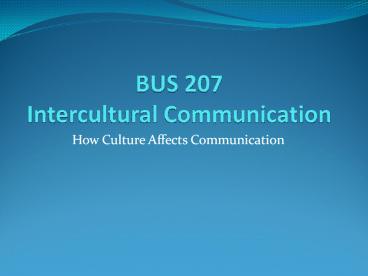BUS 207 Intercultural Communication - PowerPoint PPT Presentation
1 / 11
Title:
BUS 207 Intercultural Communication
Description:
Individualism. Collectivism. Take care of yourself and your immediate family only. Born into extended families which protect then in exchange for loyalty – PowerPoint PPT presentation
Number of Views:46
Avg rating:3.0/5.0
Title: BUS 207 Intercultural Communication
1
BUS 207Intercultural Communication
- How Culture Affects Communication
2
Facts About Culture
- Culture is learned, not innate
- Culture is an invisible force
3
Five Key Dimensions of Culture
- Context
- Individualism
- Formality
- Communication style
- Time Orientation
Textbook pages 15-19
4
Context
Textbook Page 17, Figure 1.7
5
Individualism vs. Collectivism
Individualism Collectivism
Take care of yourself and your immediate family only Born into extended families which protect then in exchange for loyalty
I consciousness We consciousness
Right to privacy Stress on belonging
Giving your opinion is important Harmony is important
Others are classified as individuals Others are classified as in group or out group
http//www.andrews.edu/tidwell/bsad560/HofstedeIn
dividualism.html
6
Individualism vs. Collectivism
Individualism Collectivism
Transgression of rules leads to guilt feelings Transgression of rules leads to shame feelings
Purpose of education is learning how to learn Purpose of education is learning how to do
Task prevails over relationship Relationship prevails over task
Personal opinion expected one person, one vote Opinions and votes predetermined by in group
http//www.andrews.edu/tidwell/bsad560/HofstedeIn
dividualism.html
7
Formality
- Tradition, ceremony and social rules
- Think of some examples of how different countries
operate differently - Some potential examples
- Names
- Directness with business
- Age
- Position
8
Hofstede Power Distance
9
Communication Style
http//www.google.ae/imgres?qcommunicationstyle
oflowandhighcontexthlenbiw1280bih562tbm
ischtbnid_7dhRMZsg0za0Mimgrefurlhttp//keys2
culture.com/intercultural-mindsetdocid
10
Time Orientation
- Monochronic view of time
- Almost a tangible substance
- Time is money
- Place importance on deadlines
- Schedules are important
- Tend to do one thing at a time
11
Time Orientation
- Polychronic Orientation
- Personal relationships more important
- Consider an objective to be achieved if possible
- Do many things at once
- Change plans easily and often































